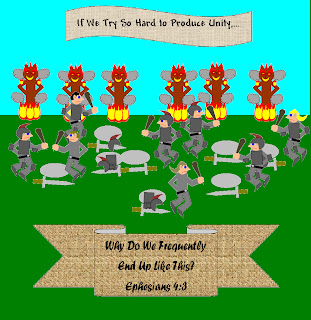Community is an important thing in our culture and an important thing in the Christian church. Yet it seems that, despite the fact the church strives for community, it frequently falls short and it is often the congregations that try hardest to produce community that fall short of it.Could it be we are trying too hard?
As C. S. Lewis points out, when even good things are made into a god, they can become a demon. In our efforts to produce community, have we perhaps made it into an idol, resulting in its own destruction? If we make community the ultimate goal, then we can become offended by anything by that falls short of our idea of community. Otherwise minor offenses can be blown out of portion as offenses against community. The normal flaws of leadership can be magnified by this, as can the typical failings of those who follow. It also can reinforce errors (such as putting down outsiders) as something "we" do.
Such community can take the forms of strict conformity or of broad acceptance. Strict conformity frequently goes beyond Biblical standards, enforcing minor teachings and petty legalisms. But it can also often require a member to meet subtle, unexpressed standards, such as having a certain type of personality. Those communities based on broad acceptance may seem more open, but often they are not. They often require members to be as broad-minded as the community and exclude those who are not. They can end up excluding or reining in anyone who is too zealous or determined in a certain area. The result may be the enforcement of mediocrity. Also, both types of community can become ingrown and unwilling to reach out to those outside. Or when they do, they can decide to only reach out to those who fit into their community.
Now the solution is not to go to an opposite extreme. We cannot solve this problem by going for total individualism or for a mechanistic view that sees other people as tools to accomplish our purposes. Rather, what we need is to put God and His truth back into the center (Matthew 6:33). We need to recognize we are sinners saved by God's grace (Romans 3:21-28). Also, that God is at work in us to transform us (2 Corinthians 3:18) and to lead us into works He has prepared for us (Ephesians 2:10). That a fundamental part of this is loving other believers (John 13:34,35), who, like us, are still in the process of becoming the people they ought to be (Philippians 3:12-16). If we do this, we will find the limited degree of real community available to us in a sinful and broken world. But if we make community our chief goal, we will be like a man pursuing a mirage in the desert. Always seeking our goal, but never able to actually reach it.
a prayer when we feel alone
7 hours ago




No comments:
Post a Comment